This article provides an overview of grounded theory research, including its history, key concepts, methods.
In the social sciences, grounded theory is a research methodology that aims to produce theory that explains data or relevant phenomena. In grounded theory research, data is collected and analyzed inductively in order to develop a theory that is “grounded” in the data.
This approach was originally developed by sociologists Barney Glaser and Anselm Strauss in the 1960s. In recent years, grounded theory has been increasingly used in a variety of disciplines, such as education, nursing, and psychology.
The purpose of this article is to provide a brief introduction to grounded theory research. This type of research is often used in the social sciences and can be described as a way of conducting qualitative research in order to develop a theory that is grounded in data. This approach is different from other types of research in that it does not start with a hypothesis, but rather allows the theory to emerge from the data.
What is Grounded theory?
In the 1960s, sociologist Barney Glaser and anthropologist Anselm Strauss coined the term “grounded theory” to refer to a research methodology that involves the construction of theories from data.
The main characteristic of grounded theory is that it is inductive, meaning that theories are derived from data rather than being preconceived. This makes grounded theory an attractive methodology for researchers who want to study phenomena in a naturalistic setting and generate new insights about them.
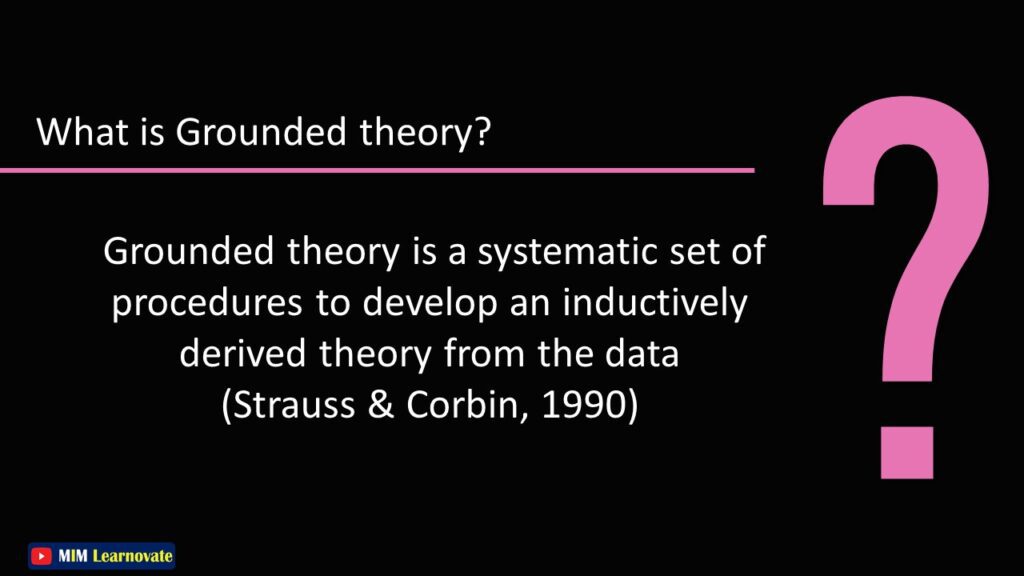
Grounded theory has been used in a wide variety of research contexts, ranging from organizational studies to health care. It is a flexible methodology that can be adapted to different types of research questions and settings.
Read More: Measurement of Scale | Examples | PPT
An organized series of steps makes up grounded theory. to create a theory deduced inductively from the data.
Although grounded theory is most frequently employed in qualitative research, it can also be used to other types of data, such as quantitative data.
Because grounded theory is such a flexible methodology, it can be used in a variety of ways.
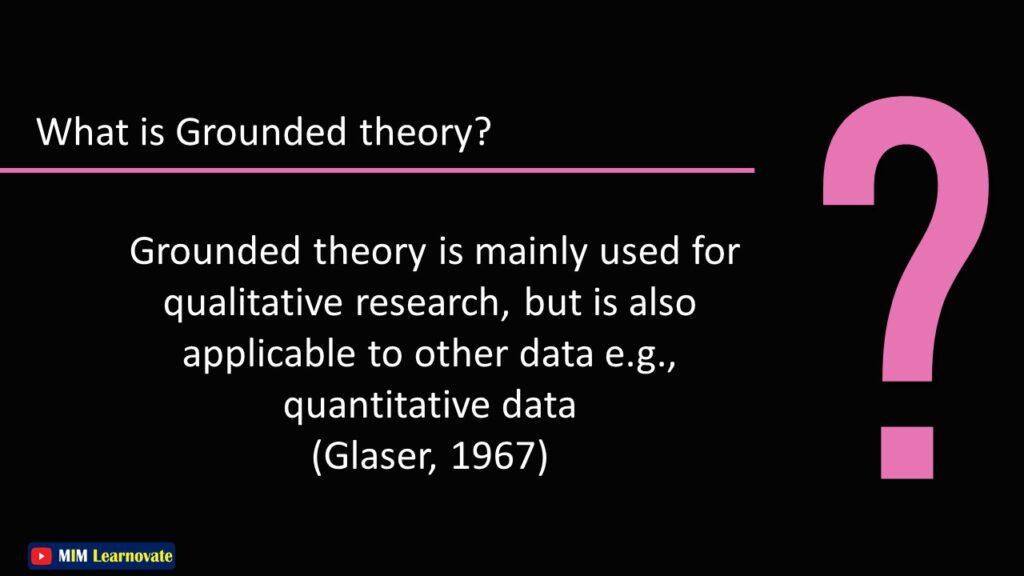
It can be used to study individual behavior or organizations as a whole. It can also be used to investigate phenomena that are difficult to observe directly.
Example of Grounded Theory
▶If a researcher wants to look into how people develop relationships, that would be an example of grounded theory. Interviews and observation would be used to gather information, which would then be analyzed to look for patterns. A theory on the formation of relationships would then be developed using these patterns.
▶Organizations can use grounded theory to provide their business a competitive edge. Here are some examples of grounded theory:
→Used in Making Decisions: Design decisions, such as how to make a more appealing logo, might benefit from grounded theory. In order to do this, the marketing department may conduct consumer interviews to learn what consumers think of their logo and what they like or dislike about it. Then, they will compile coded data related to the interviews and use it in a second iteration.
→Used in Marketing Department: By allowing marketing executives to express their ideas on how to improve their product or service in a structured manner, marketing departments use grounded theory.
→Used in HR Department: The human resource department frequently uses grounded theory. For instance, they might research the causes of employees’ frustration with their jobs. The shortcomings can be explained by the employees. Then, HR compiles this information, analyses the findings to determine the source of the issues, and offers solutions.
Read More:
- Mixed Method Research: What It Is & Why You Should Use It
- Correlational Research | Example, Types | PPT
- Conclusive Research | Types, Pros – MIM Learnovate
- Descriptive Research: Methods, Types, and Examples | PPT
- Cross-Sectional Research | Examples – MIM Learnovate
- Triangulation in Research | Types | Examples
Development of the Grounded Theory
In the late 1960s, Barney G. Glaser and Anselm L. Strauss, two sociologists, created the grounded theory. Patients at the University of California, San Francisco Medical Center who were near death were recorded and their research methods were made public.
The Discovery of Grounded Theory, a book by Glaser and Strauss, contains a detailed explanation of their grounded theory techniques (1967).
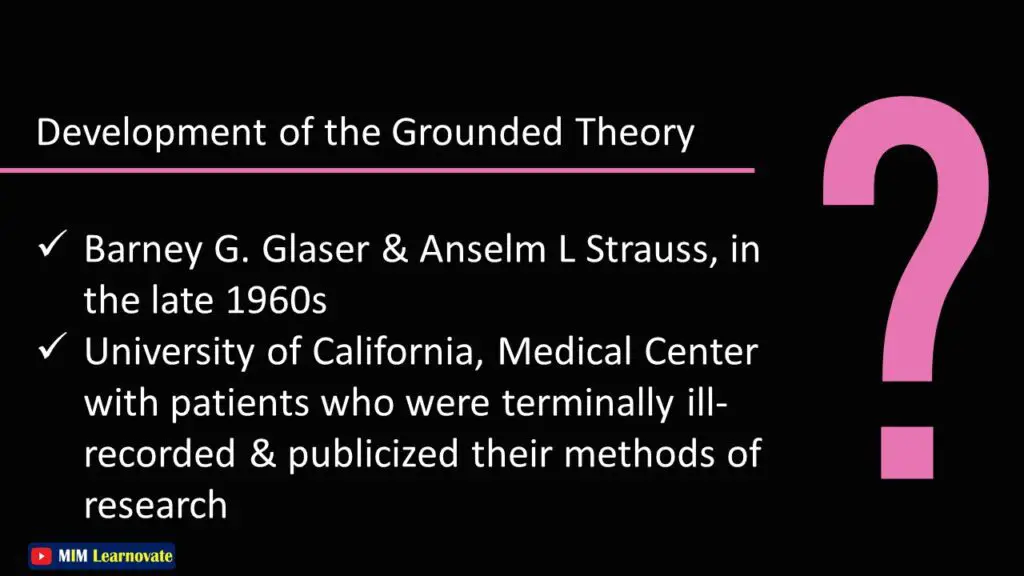
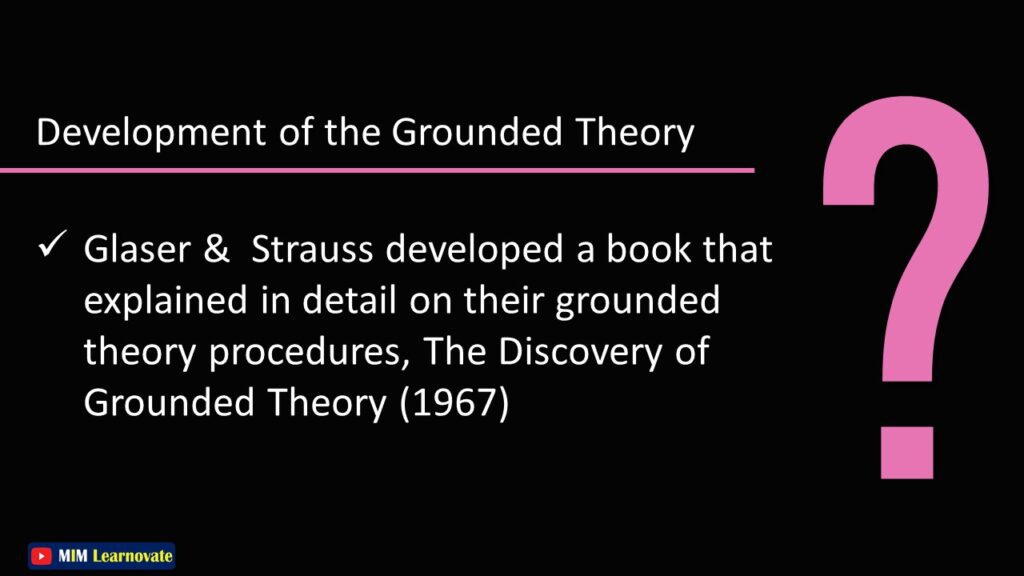
When do you use Grounded Theory?
In social science research, Grounded Theory is a research methodology that aims to create theory that is “grounded in data.”
When do you use Grounded Theory?
According to the Grounded Theory Institute, “Grounded Theory is appropriate when:
1. You want to understand the process by which a group of people (or even just one person) interact with their environment to produce certain outcomes.
2. The focus of your study is on a phenomenon about which very little is known.
3. You want your theory to emerge from data, rather than being imposed on it from external sources.”
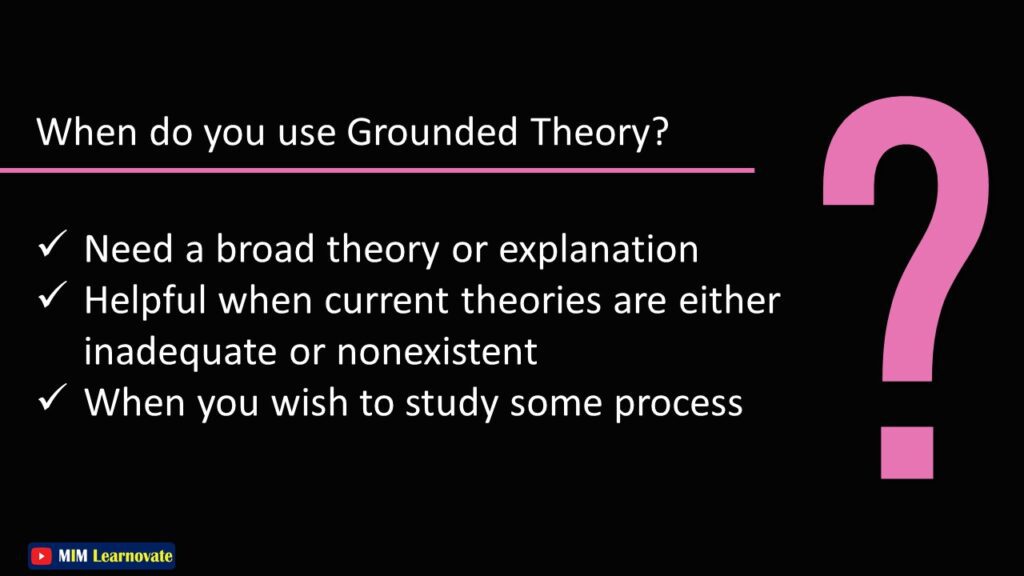
Thus, if you are interested in understanding how and why people interact with their environment in a particular way, or if you are exploring a new or under-researched topic, Grounded Theory may be the right research methodology for you.
Hence, you conduct Grounded Theory When you require a broad theory or process explanation. This is useful Especially when there are no or insufficient existing theories concerning a topic. Lastly, When you want to research a certain process, like the professional development of high-achieving Caucasian and African American women or how students become writers.
Conducting a Grounded Theory Study
[su_list icon=”icon: check-circle”]
- Decide if Grounded Theory design best addresses the research problem
- Identify a process to study
- Seek approval and access
- Conduct theoretical sampling
- Use selective coding and develop the theory
- Validate your theory
- List itWrite a grounded theory research reportem
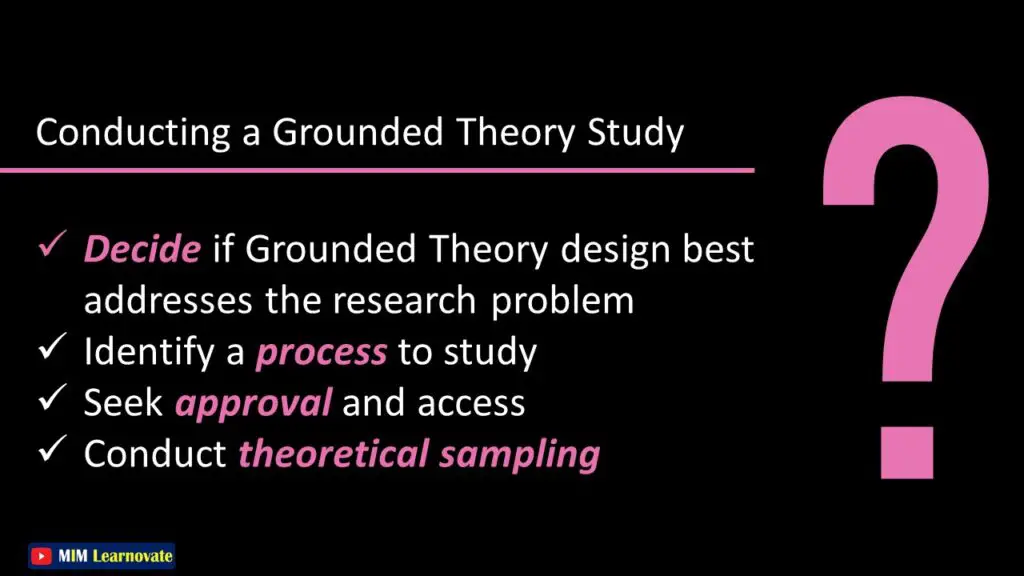
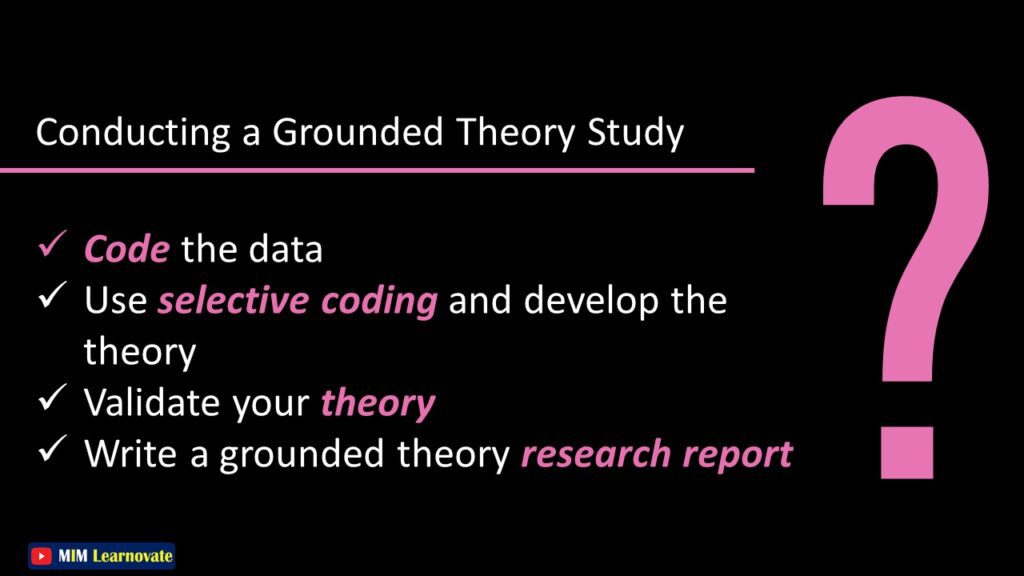
Theoretical Sampling
The analyst collaboratively gathers, codes, and analyses the data before deciding what data to collect next and where to locate them in order to improve his theory as it develops. This procedure is known as theoretical sampling.
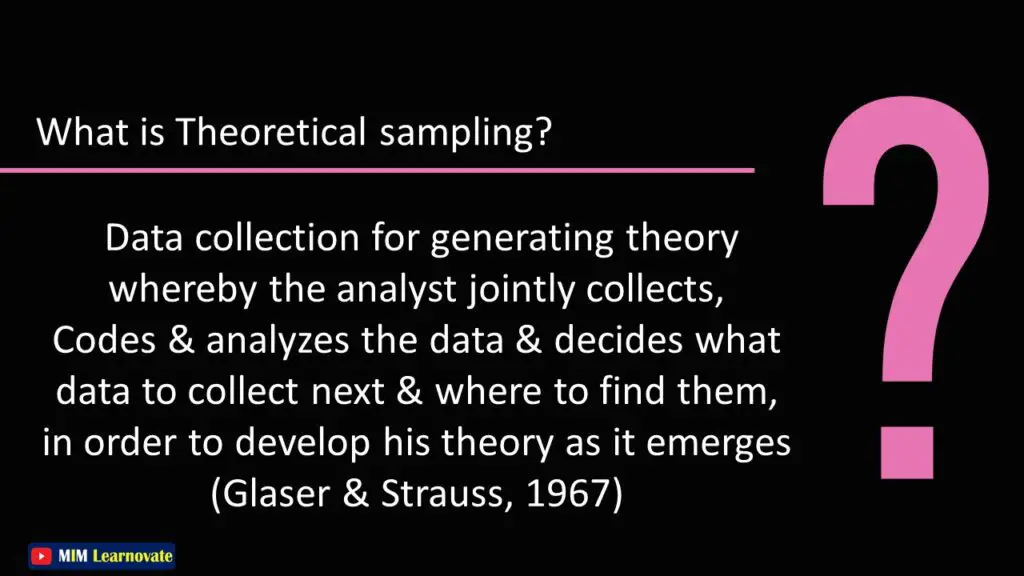
Read More:
- Abstract for Research Paper
- Types of research questions
- Case Study Research Method | Benefits, Limitations
- What is Survey Research? Types, Uses
- Research Methods: Definitions, Types
- How to Write a Synopsis for Research
- How to build Research Questions on the basis of Theoretical Model?
- How to define and refine Research Problem?
- How to identify a Research Gap in Research Articles?
Steps in Grounded Theory Approach
The grounded theory approach involves three main steps:
- Data collection
- Data analysis
- Theory development
These steps are repeated as necessary until the researcher arrives at a well-developed theory that explains the phenomenon under study.
Data collection
There are several steps involved in grounded theory research. The first is data collection, which can be done through interviews, observations, or document analysis.
Data analysis
Once the data has been collected, it must be coded and analyzed for themes and patterns.
The three steps of data analysis in Grounded Theory are as follows:
Open Coding
Line by line coding, also known as open coding, includes highlighting and moving concepts and important phrases into subcategories, then categories.
The researcher can then begin to theorize or reflect on what they are reading and understanding—making sense of the data—after this breaks the material down into conceptual components. Each participant’s data will be “constantly compared” to look for patterns.
Axial Coding
In this stage, connections and relationships between the categories are discovered.
Selective Coding
Determine the key category and methodically connect it to additional categories using selective coding. Both the categories and the relationships must be verified. After then, categories are combined and a Grounded Theory is found.
Theory development
These themes and patterns are then used to develop a theoretical model that explains the data.
Grounded theory is an iterative process, meaning that researchers will often go back and forth between data collection and analysis as they develop their theory. This process can take months or even years to complete.
Types of grounded Theory Designs
Following are the types of designs for grounded theory.
Systematic design
The systematic design of grounded theory involves the careful and systematic collection and analysis of data in order to generate theory.
Systematic design is a type of Grounded theory that is based on the systematic and rigorous application of procedures in order to generate theory.
The main goal of systematic design is to produce valid and reliable findings that can be generalized to a wider population. In order to achieve this, researchers must follow a set of specific steps during the data collection and analysis process.
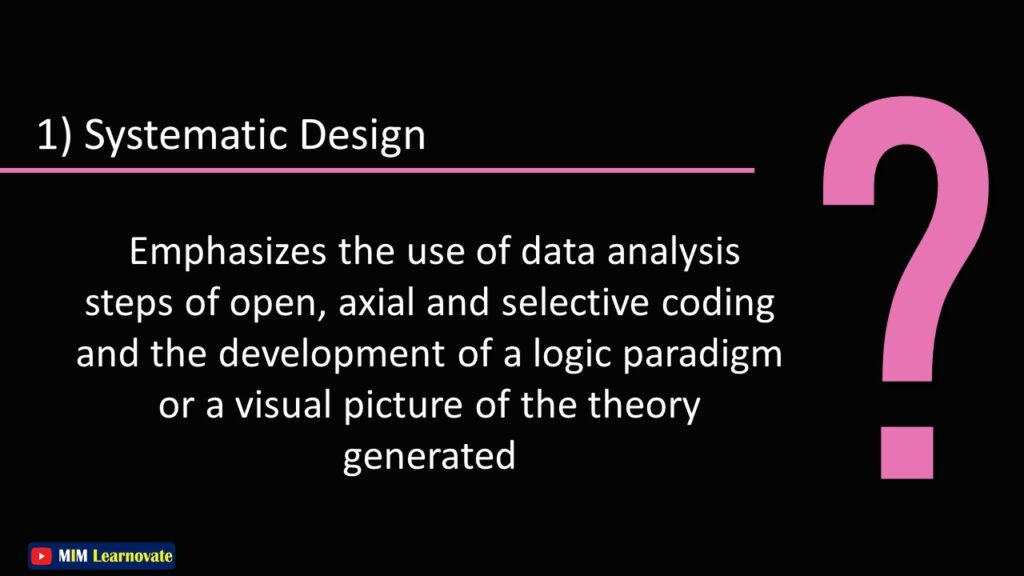
Systematic design has been shown to be an effective method for generating new knowledge about a phenomenon.
The main strength of this approach is its rigor, which allows for the production of reliable and valid findings. Additionally, systematic design is flexible, allowing researchers to adapt the methodology to different types of phenomena.
A systematic design in grounded theory places an emphasis on the use of open, axial, and selective coding in data processing processes and the creation of a logic paradigm or visual representation of the theory developed. There are three coding phases according to this definition.
Emerging Design
Glaser emphasizes the value of allowing a theory to develop from the evidence as opposed to applying predetermined, rigid categories.
This emerging design in grounded theory offers many benefits for researchers. It is an efficient and effective way to study complex phenomena, and it generates rich data that can be used to develop theories.
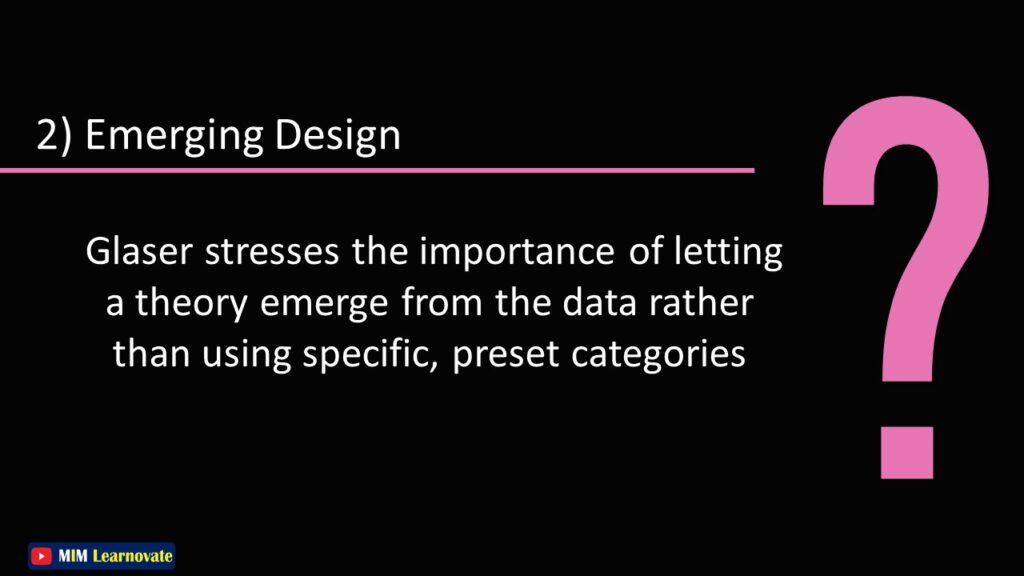
Constructivist Approach
In recent years, a new type of Grounded theory has emerged as a popular method for conducting research. This approach, known as Constructivist Grounded theory, offers a number of advantages over traditional methods.
Constructivist Grounded Theory, developed by Charmaz in 1983, takes a more inductive approach. Kathy Charmaz has described the constructivist method. She focuses on the significance of the meanings that people give to the study’s focal point.
The researcher does not start with a pre-existing theory but rather allows the data to emerge from the research process and drives the development of theory from there. This type of Grounded Theory is more suitable for exploratory studies.
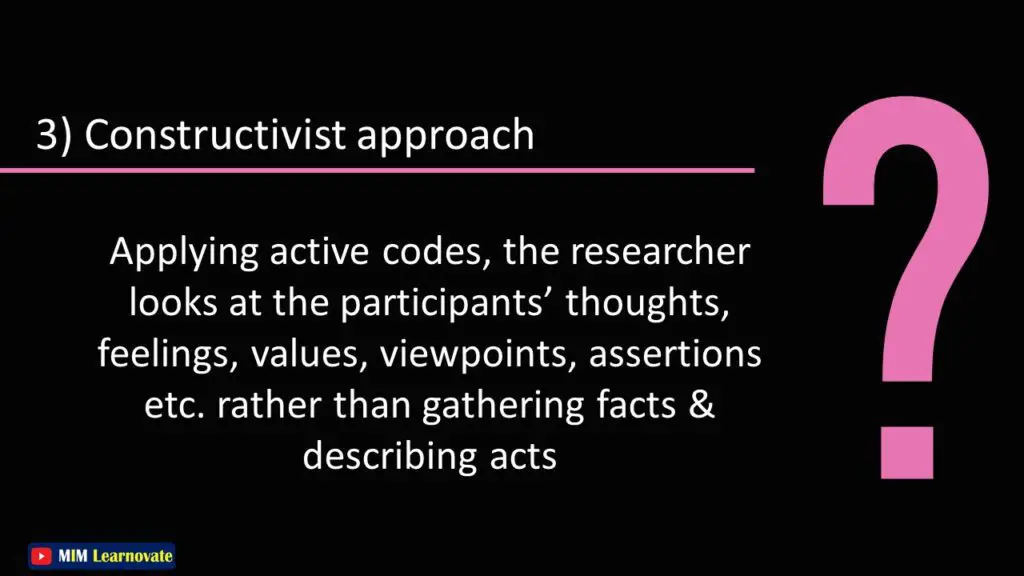
Instead of gathering information and reporting acts, the researcher uses active codes to examine the thoughts, feelings, values, opinions, statements, etc. of the participants.
Constructivist Grounded theory is particularly well-suited for studying complex phenomena. It allows researchers to simultaneously collect and analyze data, making it an efficient way to conduct research.
Additionally, this approach generates rich, detailed data that can be used to develop theories about the phenomenon being studied.
Classical Grounded Theory
Classical Grounded Theory is the original version of the methodology proposed by Glaser and Strauss in 1967. It is a deductive approach that begins with a pre-existing theory which the researcher uses to guide their data collection and analysis. The aim is to develop or test the theory further through empirical evidence.
Read More: Chi-Square Test (Χ²) || Examples, Types, and Assumptions
Post-modern Grounded Theory
Post-modern Grounded Theory, as proposed by Chia in 2002, takes an even more inductive approach than constructivist Grounded Theory.
Advantages of Grounded Theory
The advantages of using grounded theory as a research methodology are numerous.
First, grounded theory allows for the development of rich and detailed theories. This is because the data collected is used to generate and test the theories, rather than the theories being imposed on the data.
An understanding of phenomena that cannot be explained by pre-existing theories and paradigms can be developed with the aid of grounded theory. You are most likely to receive great grades for your dissertation if this process is used properly.
Second, grounded theory is an iterative process, which means that new data can be collected and used to refine and improve existing theories.
Third, grounded theory encourages researcher reflexivity, or the ability to reflect on one’s own biases and preconceptions. This helps to ensure that the research is objective and unbiased.
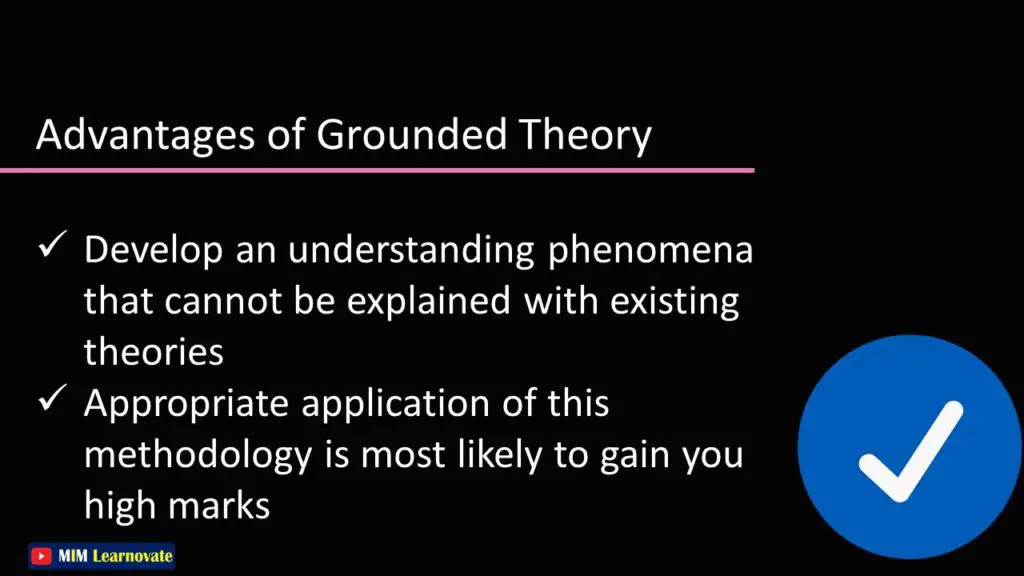
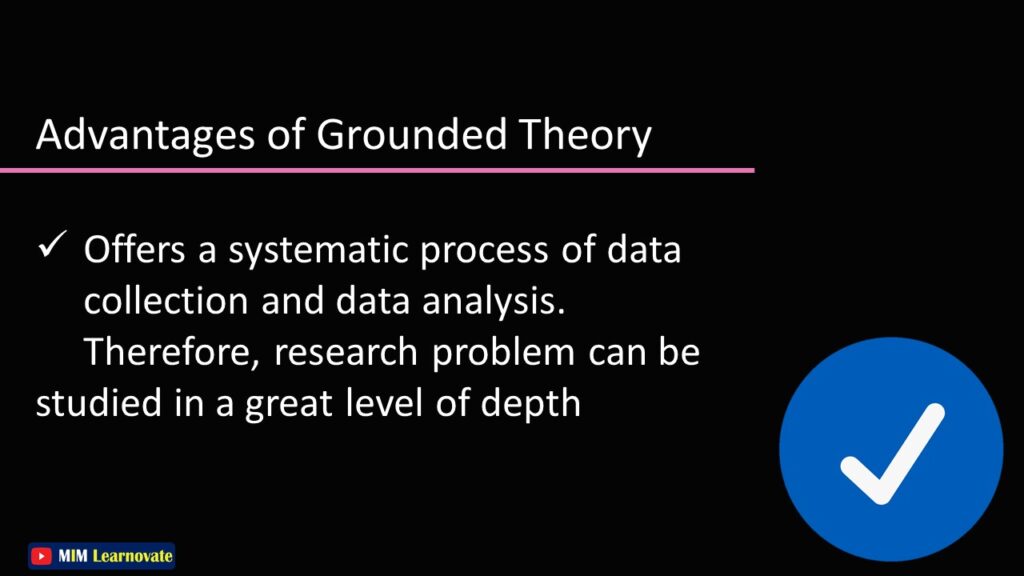
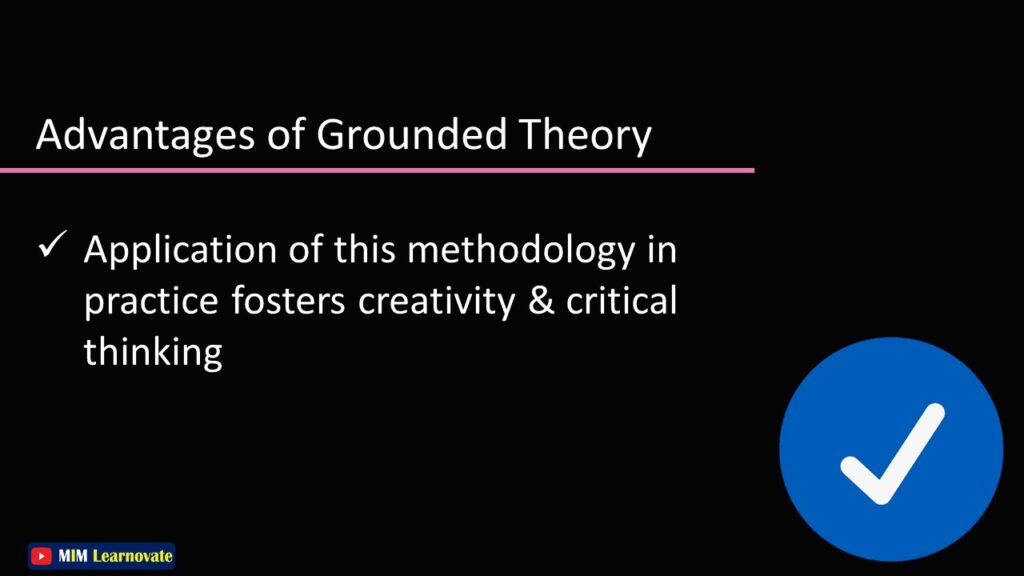
This methodology offers a methodical and exacting procedure for gathering and analyzing data. As a result, the research problem can be thoroughly examined.
The practical use of this methodology encourages imagination and analytical thinking.
In the social sciences, grounded theory is a research methodology that aims to produce theory that is grounded in data. This means that the theory generated by the researcher is based on and derived from the data collected.
Read more: T-test | Example, Formula | When to Use a T-test
Disadvantages of Grounded Theory
There are a few disadvantages to using grounded theory in research.
One is that it can be time consuming, as data must be collected and coded in order to develop a theory. This can make it difficult to replicate studies using this method.
Additionally, because the theory emerges from the data, it may be less generalizable than theories that are developed prior to data collection.
Finally, grounded theory can be challenging to use in quantitative research designs.
There is a lot of possibility for bias created by the researcher.
It is not simple to present research findings in a grounded theory.
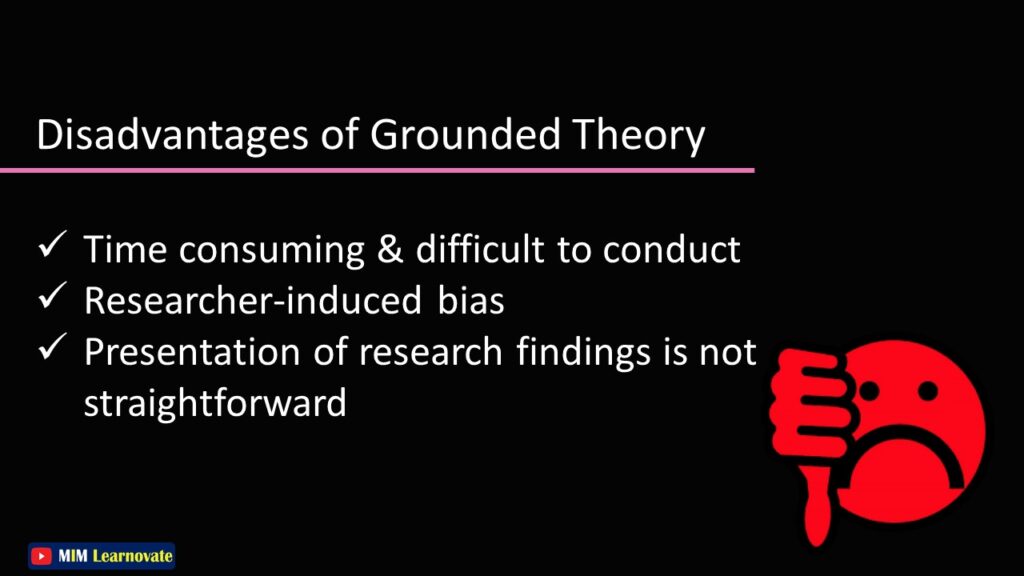
Conclusion
In conclusion, grounded theory is a research method that can be used to generate new theories by data collection and analysis. The goal of grounded theory is to develop a conceptual understanding of a phenomenon, which can be used to guide future research and practice. Although it has some disadvantages, such as the time commitment required and the need for skilled researchers, grounded theory is a powerful tool for generating new knowledge.
This article has provided an overview of grounded theory research, including its history, pros, cons, methods.
Other articles
Please read through some of our other articles with examples and explanations if you’d like to learn more about research methodology.
Statistics
Methodology
- Research Methods
- Quantitative Research
- Qualitative Research
- Case Study Research
- Survey Research
- Conclusive Research
- Descriptive Research
- Cross-Sectional Research
- Theoretical Framework
- Conceptual Framework
- Triangulation
- Grounded Theory
- Quasi-Experimental Design
- Mixed Method
- Correlational Research
- Randomized Controlled Trial
- Stratified Sampling
- Ethnography
- Ghost Authorship
- Secondary Data Collection
- Primary Data Collection
- Ex-Post-Facto
Research
- Table of Contents
- Dissertation Topic
- Synopsis
- Thesis Statement
- Research Proposal
- Research Questions
- Research Problem
- Research Gap
- Types of Research Gaps
- Variables
- Operationalization of Variables
- Literature Review
- Research Hypothesis
- Questionnaire
- Abstract
- Validity
- Reliability
- Measurement of Scale
- Sampling Techniques
- Acknowledgements




15 Comments
Greetings! Very helpful advice on this article! It is the little changes that make the biggest changes. Thanks a lot for sharing!
I just like the helpful information you provide in your articles
That’s good, but I still don’t understand the purpose of this page posting, no or what and where do they get material like this.
Pretty! This has been a really wonderful post. Many thanks for providing these details.
This is really interesting, You’re a very skilled blogger. I’ve joined your feed and look forward to seeking more of your magnificent post. Also, I’ve shared your site in my social networks!
Great information shared.. really enjoyed reading this post thank you author for sharing this post .. appreciated
I do not even understand how I ended up here, but I assumed this publish used to be great
This was beautiful Admin. Thank you for your reflections.
For the reason that the admin of this site is working, no uncertainty very quickly it will be renowned, due to its quality contents.
Great information shared.. really enjoyed reading this post thank you author for sharing this post .. appreciated
I appreciate you sharing this blog post. Thanks Again. Cool.
Nice post. I learn something totally new and challenging on websites
Good post! We will be linking to this particularly great post on our site. Keep up the great writing
For the reason that the admin of this site is working, no uncertainty very quickly it will be renowned, due to its quality contents.
I like the efforts you have put in this, regards for all the great content.